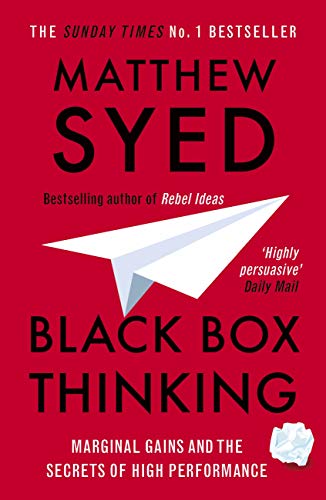Welcome to Thinkers Books, a platform dedicated to distilling wisdom from some of the most thought-provoking books across diverse genres. Today, we delve into a compelling work that redefines our understanding of failure and its role in personal growth. We invite you to embark on this enlightening journey with us as we explore Matthew Syed’s ‘Black Box Thinking.’
‘Black Box Thinking,’ penned by the acclaimed journalist and author Matthew Syed, is a revolutionary take on success, failure, and learning. Syed is a well-recognized figure whose work revolves around the science of high performance. His unique perspective on failure as a potent tool for growth forms the crux of this book.
This work emphasises the invaluable lessons we can glean from our failures rather than our successes. It takes the reader through various industries and case studies demonstrating how accepting defeat and fostering a growth mindset can spur innovation and success. Syed encourages us to be receptive to criticism and change, thereby evolving into resilient and adaptive thinkers.
The book begins with a comparison between the aviation and healthcare sectors. Every mishap in aviation is meticulously analysed using black box data, significantly enhancing safety measures. Conversely, in healthcare, errors are frequently overlooked or concealed, thus obstructing progress and innovation.
Syed introduces the concept of “cognitive dissonance,” the unease experienced when confronted with contradictory beliefs or information. This often leads to denial and self-justification, barring us from learning from our mistakes. He proposes adopting a growth mindset to counter cognitive dissonance, emphasising the value of learning from failure.
Using various case studies, Syed illustrates how acknowledging failure is vital for success. James Dyson, for instance, crafted 5,127 prototypes before perfecting his vacuum cleaner. Likewise, David Brailsford, the former performance director of British Cycling, employed a “marginal gains” approach to transform the team into Olympic champions by addressing and enhancing minor weaknesses.
The book also delves into the efficacy of feedback loops in facilitating learning from mistakes and adjusting strategies accordingly. Syed elucidates how companies like Google and Pixar leverage feedback loops to foster innovation and continuously refine their products.
Here are my top 5 insights from ‘Black Box Thinking’:
- Embrace failure: Successful individuals and organisations perceive failure as an opportunity for learning and growth. Instead of avoiding setbacks, analyse them and utilise the lessons to progress.
- Adopt a growth mindset: A growth mindset promotes continuous learning and enhancement, enabling you to become more adaptive and resilient amidst challenges.
- Cultivate feedback loops: Seek feedback regularly and fine-tune your strategies based on it. This iterative process allows for faster identification of weaknesses and improvements.
- Overcome cognitive dissonance: Be conscious of your biases and open to modifying your beliefs when presented with new information. This adaptability fosters a willingness to learn from failure.
- Focus on marginal gains: Incremental improvements can culminate in significant overall progress. Identify areas for minor changes and observe your success compound over time.
In conclusion, ‘Black Box Thinking’ is a paradigm-shifter. It offers a profound insight into failure and success, inspiring a shift in perspective towards viewing setbacks as growth opportunities and openness to criticism and change. Embrace a growth mindset and strive persistently for self-improvement.
We would love to hear your thoughts on ‘Black Box Thinking.’ What were your main takeaways? Feel free to share your insights and experiences at thinkersbooks.com. As we conclude our exploration of ‘Black Box Thinking,’ we leave you with a potent quote from the book: “The greatest mistake you can make in life is to be continually fearing you will make one.” So embrace failure, learn from it, and unlock your full potential!
We hope you enjoyed this summary and invite you to explore more such summaries at Thinkers Books. Happy reading!







